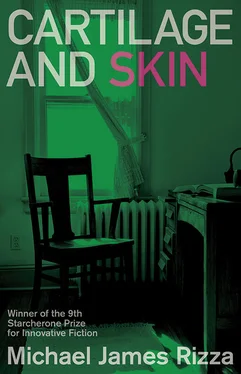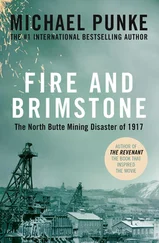“Well, can you get it for me later then?” I asked, with a sly suggestion in my tone, as if I knew that he had the address memorized and, moreover, I understood the reason for his denial. “Just get it for me later,” I said, aware that I was provoking him.
I wanted to end this conversation. I felt amazingly calm and somewhat amused.
“Dr. Parker,” he snarled, brandishing the shovel.
Ready to leave, I no sooner closed the notebook and returned the pen to my pocket than I found myself suddenly tumbling spastically over the side railing and landing on the sidewalk. Sprawled face down on the cold, wet concrete, I felt as though my head was shattered. I tasted blood in my mouth, and I knew that it was welling up in my eyes. Terrified, I tried to push myself up, and supporting myself on one forearm, I looked at the dizzying ground several inches before my face, where a crimson spot swirled in a patch of snow. My entire head throbbed with blood, as I started to sink back to the ground, which was now heaving beneath me, as if I were floating on the surface of rough waters, swirling away toward some dismal void. Before the darkness completely swallowed me up, I was frightfully convinced that splinters of bone were piercing the gray pulp of my brain, and what was worse was that I needed to get away, but I couldn’t. I was losing consciousness. Fading and throbbing, I was anxious for the petty, bitter little man — straddled above me in a posture of outraged morality — to bring his shovel down upon my head for a second, a third, and then a final time.
The boy’s story came out of him in pieces. I learned most of it secondhand and a little bit directly. The elapsed years have granted me the objective distance needed to consider his story calmly. I have rounded it out, given it flesh, and filled its darkest places with my imagination. I have labored under the aegis of past masters, in search of an appropriate prose style, and discovered that maybe “this is the saddest story I ever heard.” It belongs to “the record of humanity,” which, indeed, “is a record of sorrows.” But how can I begin to put these people on paper, when, in elegant English, one of my masters inquires, “Who in this world knows anything of any other heart — or of his own?” In fluid French, another one remarks that “our social personality is a creation of the thoughts of other people… We pack the physical outline of the person we see with all the notions we have already formed about him…, that each time we see the face or hear the voice it is these notions which we recognize and to which we listen.” Even so, perhaps out of a repudiation of the tree-shaped social worker, I seem to be primarily influenced by a concise, imperative German voice. “Never again psychology.” In search of a style, I have “packed” myself with voices, and for the boy’s story I would like to choose one that is fair and calm, as indifferent as the night sky, into which I now gracefully fade, so the boy may increase all the more, which is a Johannine doctrine, appropriate for a love story.
Suppose for a moment that a tall man, bundled against the cold, began to fill his car with boxes of books. Or, better yet, a different man stirred sleepily in his bed and reached over for his wife who was no longer there. But wait. Perhaps it’s better to begin with a picture of the boy. But no, wait a moment: not the boy, but a boy. Yes. Now suppose the cold again. Now the picture; it begins to take shape. It is all picture, all image. It is, yes. Suppose this:
I
It was a high country, as cold as iron, still and gray. The road was lined with sheer black rock on one side, and overlooked a pitched landscape, blanketed with snow and cluttered with evergreens, on the other. A silver colored sedan appeared out of the dawn. In the backseat, a boy leaned his head against the window, staring out at the rock or maybe at the streams of ice that clung to its face, as though flowing water had been caught by surprise by the cold, even though the cold seemed as if it had always been there, and it would always be there, so there never could have been water in the first place, only ice.
The car’s tires made a steady, whispering sound.
A thin girl sat cross-legged in the front seat, with her long fingers laced between her naked toes. She had directed all the heater vents toward herself. She was biting her bottom lip and slightly bobbing her head; she was in control of the radio. Every once in a while, she turned around in the seat and watched a baby who seemed to be not only sedated but also strapped and bound in a car seat. The girl leaned forward and rested the tip of her finger on the baby’s lips, but the baby didn’t respond. The girl grinned as if the child had just communicated something that only she understood.
“Why are you always trying to upset her?” the mother asked. She had both of her hands on the steering wheel and the seat so forward that she appeared cramped.
“I’m not,” the girl said. She lightly ran her finger down the bridge of the sleeping baby’s nose, then turned around, and gave her attention back to the radio. She adjusted the volume but left the station alone.
The boy watched the road whispering beneath them. Mildly entranced by the endless stretch of guardrail, he looked as though he were ready to fall asleep. He had dark pupils and long lashes. His cheekbones and jaw would have been sharp and angular if not softened by his smooth, almost feminine skin. His thick, red lips were somewhat ludicrous for a young boy, making him appear at once oddly sensual and apathetic. Although his face hinted that he would one day possess an exotic beauty, now he seemed to be in a constant state of pouting and languishing.
When it began to snow, the mother pulled herself up in the seat. An elastic band held her hair back from her face. Without makeup, her face looked blotched, worn, and tired. She was dressed in dark blue sweat-clothes and a pair of sneakers. At first, the snow vanished as soon it hit the windshield, but eventually she had to put on the wipers. Despite the radio and the gentle sound of the tires, everything was hushed: the baby sleeping, the boy gazing out the window, and the girl in the front seat abstractedly occupying herself with her own fingers and toes.
The road wound downward; its surface gleamed black and wet, with an occasional dirty patch of churned snow. From the right, a river came out of the mountains and began to follow the road for a while. Thick ice lined its banks, and the water seemed as motionless as the road itself. Farther ahead, as if at the very base of the desolate landscape, the road and the river crossed and went their separate ways at a stout, dull green, metal bridge. It was here that the car abandoned the road and seemed to ease itself into the water without making a sound. The car submerged, and bubbles burst to the surface as air rushed out of the vehicle.
Then everything was very quiet and undisturbed.
Inside the car, however, it became darker and darker as it sank, sealing within itself a wild, savage flutter of limbs and bodies that beat at the windows and tore at the seats, hysterical voices mingled with cries — a convoluted mess of fear, panic, and desperation — until the rising waters seeped in and drowned it all, first with silence, then with darkness.
About fifty yards from the bridge, an object, as dark and indistinct as a piece of driftwood, broke the surface of the water. It floated with the slow current, dragged against the icy bank for a ways, and was finally caught in a tangle of pale, yellow weeds. The flowing water made a trickling sound as it passed the body. Only a clump of wet hair was visible, like that of a lifeless beaver or rat washed ashore. Then maybe because of the steady force of the current or an abrupt weakest in the yellow weeds, the body rolled over and a sliver of face appeared in the open air. In time, the falling snow would have covered it, but all of a sudden, as if startled from a violent dream, the head and torso rose upright. Without looking around, with a strange, silent calmness, the boy turned over and crawled up the bank. He crawled until he came to the road; then he got to his feet and walked along the black pavement. He limped because one sneaker was missing. He seemed to be heading toward the bridge, but then he crossed the road and sat down with his back against the guardrail. He drew his knees up to his chest, wrapped his arms around his shins, and stared forward, neither at the falling snow nor at the nearest mountainside. He stared blankly, calmly, with an attitude as detached as a corpse’s. After a while, he let his chin rest on his knee, and his head sunk so forward that in all appearances he was probably dead.
Читать дальше












